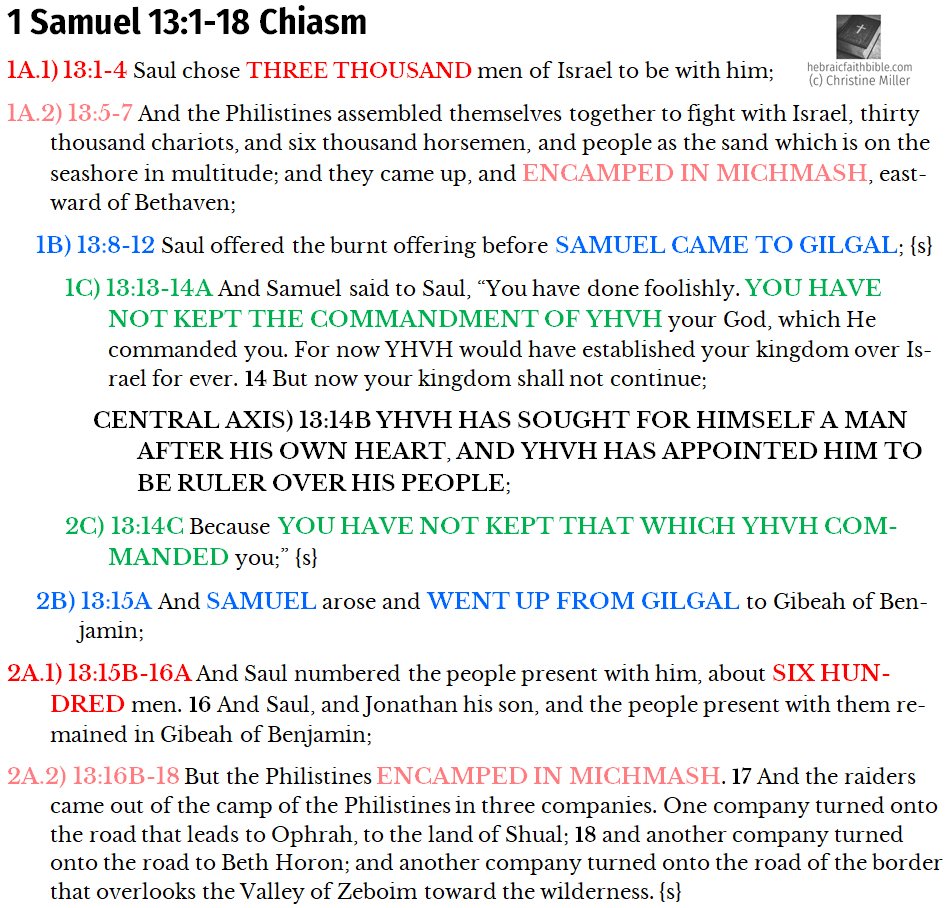Read 1 Samuel 13 here (text coming …) or at Bible Gateway.
The Hebrew paragraphs:
13:1-12 {s} Saul gathered Israel to war against the Philistines; but unlawfully offered the sac-rifice
13:13-14 {s} Saul did not keep the commandment of YHVH, so his kingdom will not contin-ue
13:15-18 {s} The army in Gibeah/ 3 companies of raiders of the Philistines went throughout Israel
13:19-23 {s} Israel had no weapons, for the Philistines took away their blacksmiths
1 Samuel 13:1-18 Chiastic Structure:
Saul was —- years old when he began to reign; and he reigned two years over Israel. 1 Sam 13:1, JPS translation
Saul reigned one year; and when he had reigned two years over Israel … 1 Sam 13:1, NKJV translation
Why the discrepancy? The Hebrew in verse 1 is admittedly difficult, and modern understanding of it is most likely missing some nuances, which has led to widely varying translations of the text. (The Septuagint is no help here, I checked.) Then the widely varying translations further lead to charges that the Biblical text is inaccurate, or corrupted, or at any rate can’t be trusted. Is that true?
No.
The confusion comes in because verse 1 makes it seem as if the battle with the Philistines takes place two years after Saul’s coronation and the deliverance of the men of Jabesh-Gilead that we just read in chapter 11. How we know that it did not happen that way:
And he [Saul] waited seven days, according to the set time that Samuel had appointed; but Samuel did not come to Gilgal; and the people were scattered from him. 1 Sam 13:8
When did Samuel set the time of seven days? Several chapters ago.
“And you shall go down before me to Gilgal; and, behold, I will come down to you, to offer burnt offerings, and to sacrifice peace offerings. You shall wait seven days until I come to you, and tell you what you are to do.” 1 Sam 10:8
So if the time of seven days was set in chapter 10, and Samuel was late getting to the appointment in chapter 13, then only seven days had passed from chapter 10 to chapter 13, and not one or two years. So then what are we to make of verse 1?
This single verse is an introductory note to the whole history of Saul’s reign, and not meant to be included in the progression of the story. It is put here because Saul had just been confirmed in his kingship at the end of chapter 11 (skipping chapter 12 since that is Samuel’s address to the nation following the coronation). Chapter 13 begins the official record of Saul’s reign, telling his age upon ascension and the years of his reign. Verse 2 picks up again with the immediate history following his coronation, seven days later.
Ancient peoples didn’t always record events in the same manner that we do today. It wasn’t uncommon for ancient Near Eastern royal annals to start with a brief overview of a king’s reign before diving into specific events. We will see this same practice at the beginning of reigns in Kings and Chronicles as well, when we get to them.
The problem is not corruption or an inaccurate text, but that we are conditioned to expect chronological storytelling, and interpret everything through that lens.


















Leave a Reply